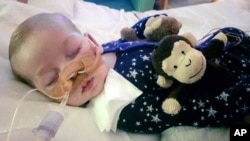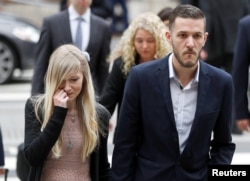British infant Charlie Gard, who was at the center of an intense debate over children's rights in health care, died in a hospice facility Friday after his life support systems were removed.
Gard was 11 months old and suffered from a rare genetic disease — encephalomyopathic mitochondrial DNA depletion syndrome — which rendered him unable to see, hear, move, breathe, cry, or swallow. He was one of only 16 confirmed cases worldwide.
After a long, unsuccessful court battle waged by his parents to take him to the United States for experimental treatment, Gard was taken off his ventilator on Friday and died soon after.
"Our beautiful little boy has gone. We are so proud of you, Charlie," his mother, Connie Yates, said in a statement Friday.
The decision to end the baby's life came Thursday after Gard's parents and Great Ormond Street Hospital in London failed to agree on an end-of-life care plan.
"It is not in Charlie's best interests for artificial ventilation to continue to be provided to him, and it is therefore lawful and in his best interests for it to be withdrawn," the court order said.
Earlier this year, the hospital treating Gard asked for court permission to remove him from life support, saying that keeping him alive was merely causing more suffering.
Yates, along with the infant's father, Chris Gard, disagreed and sought permission to take their son to the United States for experimental treatment. The British courts and the European Court of Human Rights in Strasbourg, France all backed the hospital.
The Court of Human Rights argued that "undergoing experimental treatment with no prospects of success would offer no benefit, and continue to cause [Gard] significant harm."
The case captured global attention after world leaders like U.S. President Donald Trump and Pope Francis weighed in, offering support.
Earlier this week, the baby's parents abandoned their months-long legal fight, acknowledging the illness was untreatable.
They then asked to take their son home to die, a request the hospital denied. According to the hospital, the "invasive ventilation" that Gard required was only available in the hospital and that the machines would not fit into the family's home in London.
Under British law, children hold rights independent of their parents, meaning the parents do not always have the absolute right to make medical decisions for them. Great Ormond Street Hospital released a statement expressing regret over the public disagreement.
"We deeply regret that profound and heartfelt differences between Charlie's doctors and his parents have had to be played out in court over such a protracted period," the statement read. "While we always respect parents' views, we will never do anything that could cause our patients unnecessary and prolonged suffering. The priority of our medical staff has always been Charlie."

